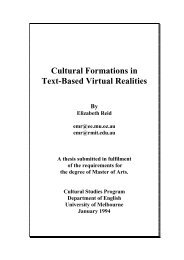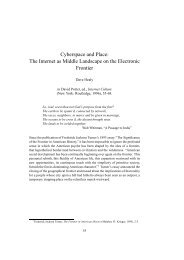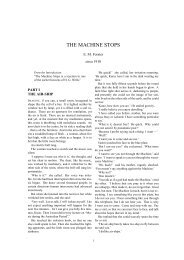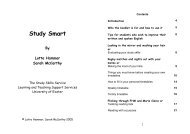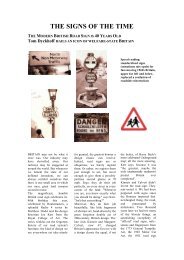PDF - The Metaphysics of Virtual Reality - University of Exeter
PDF - The Metaphysics of Virtual Reality - University of Exeter
PDF - The Metaphysics of Virtual Reality - University of Exeter
Create successful ePaper yourself
Turn your PDF publications into a flip-book with our unique Google optimized e-Paper software.
truth, which is also a l<strong>of</strong>ty realm <strong>of</strong> intellectual beauty stripped <strong>of</strong> the imprecise impressions<br />
<strong>of</strong> the senses. Thus the liberation from the Cave requires a reeducation <strong>of</strong><br />
human desires and interests. It entails a realization that what attracts us in the sensory<br />
world is no more than an outer projection <strong>of</strong> ideas we can find within us. Education<br />
must redirect desire toward the formally defined, logical aspects <strong>of</strong> things. Properly<br />
trained, love guides the mind to the well-formed, mental aspects <strong>of</strong> things.<br />
Cyberspace is Platonism as a working product. <strong>The</strong> cybernaut seated before us,<br />
strapped into sensory-input devices, appears to be, and is indeed, lost to this world.<br />
Suspended in computer space, the cybernaut leaves the prison <strong>of</strong> the body and emerges<br />
in a world <strong>of</strong> digital sensation.<br />
This Platonism is thoroughly modern, however. Instead <strong>of</strong> emerging in a sensationless<br />
world <strong>of</strong> pure concepts, the cybernaut moves among entities that are well<br />
formed in a special sense. <strong>The</strong> spatial objects <strong>of</strong> cyberspace proceed from the constructs<br />
<strong>of</strong> Platonic imagination not in the same sense that perfect solids or ideal numbers<br />
are Platonic constructs, but in the sense that inFORMation in cyberspace inherits<br />
the beauty <strong>of</strong> Platonic FORMS. <strong>The</strong> computer recycles ancient Platonism by injecting<br />
the ideal content <strong>of</strong> cognition with empirical specifics. Computerized representation <strong>of</strong><br />
knowledge, then, is not the direct mental insight fostered by Platonism. <strong>The</strong> computer<br />
clothes the details <strong>of</strong> empirical experience so that they seem to share the ideality <strong>of</strong><br />
the stable knowledge <strong>of</strong> the Forms. <strong>The</strong> mathematical machine uses a digital mold to<br />
reconstitute the mass <strong>of</strong> empirical material so that human consciousness can enjoy an<br />
integrity in the empirical data that would never have been possible before computers.<br />
<strong>The</strong> notion <strong>of</strong> ideal Forms in early Platonism has the allure <strong>of</strong> a perfect dream. But<br />
the ancient dream remained airy, a landscape <strong>of</strong> genera and generalities, until the hardware<br />
<strong>of</strong> information retrieval came to support the mind’s quest for knowledge. Now,<br />
with the support <strong>of</strong> the electronic matrix, the dream can incorporate the smallest details<br />
<strong>of</strong> here-and-now existence. With an electronic infrastructure, the dream <strong>of</strong> perfect<br />
FORMS becomes the dream <strong>of</strong> inFORMation.<br />
89



